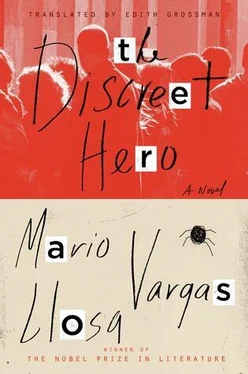She didn’t leave the house again that day or night, devoured by doubts, her head a madhouse. The only thing that was clear was that she was fucked and would keep being fucked because of the mistake she’d made when she got involved with Miguel and agreed to this charade.
She ate nothing that night; she fixed a ham and cheese sandwich but she couldn’t even taste it. She went to bed thinking that in the morning the two cops would be back to ask what her answer was. She spent the whole night worrying, making plans and then changing them. Sometimes she was overcome by sleep, but as soon as she dozed off she would wake in a fright. When the first light of the new day came into the house in Castilla, she felt herself growing calmer. She began to see things clearly. A short time later, she’d made her decision.
The winter Tuesday in Lima, which Don Rigoberto and Doña Lucrecia would consider the worst day of their lives, dawned, paradoxically, with a cloudless sky and the promise of sun. After two weeks of persistent fog and damp and an intermittent drizzle that barely wet anything but penetrated down to one’s bones, this kind of beginning seemed a good omen.
Rigoberto’s appointment in the office of the examining magistrate was for ten that morning. Dr. Claudio Arnillas, with his invariable gaudy suspenders and crooked-leg walk, picked him up at nine, as previously arranged. Rigoberto thought this new proceeding before the judge would, like the earlier ones, be a sheer waste of time — stupid questions about his duties and responsibilities as manager of the insurance company, to which he would reply with obvious explanations and equivalent foolishness. But this time he discovered that the twins had escalated their judicial harassment; in addition to paralyzing his retirement process under the pretext of examining his responsibilities and personal income during his years of service at the company, they’d opened a new judicial investigation into an alleged fraudulent action to the detriment of the insurance company in which he had supposedly been an accessory after the fact, a beneficiary, and an accomplice.
Don Rigoberto barely remembered the episode, which had occurred three years before. The client, a Mexican residing in Lima, owner of a small farm and a factory that produced dairy products in the Chillón valley, had been the victim of a fire that destroyed his property. Following the police investigation and the judge’s decision, he was compensated according to his policy for the losses he’d suffered. When, after a partner’s accusations, he was charged with contriving to set the fire himself in order to fraudulently collect the insurance, the individual had already left the country, leaving no trace of his new location, and the company had been unable to recoup its losses from the swindle. Now the twins said they had proof that Rigoberto, manager of the company, had acted negligently and suspiciously throughout the entire affair. The proof consisted of the testimony of a former employee of the company who’d been fired for incompetence and who claimed he could prove the manager had been in cahoots with the swindler. It was a preposterous situation, and Dr. Arnillas, who’d already filed a judicial rejoinder against the twins and their false witness for libel and slander, assured him the accusation would collapse like a house of cards; Miki and Escobita would have to pay fines for offenses to his honor, false testimony, and intent to defraud justice.
The process took the entire morning. The narrow, suffocating office was simmering with heat and flies, and the walls were marred by tacked-up forms. Sitting in a small, rickety chair that barely held half his buttocks and, to make matters even worse, that rocked back and forth, Rigoberto was constantly balancing to avoid falling to the floor as he responded to the judge’s questions, which were so arbitrary and absurd that, he said to himself, they had no purpose other than to waste his time and make him lose his temper and his patience. Had this judge also been bribed by Ismael’s sons? Every day that dissolute pair piled on another annoyance intended to force him into testifying that their father wasn’t in his right mind when he married his servant. Not only holding up his retirement but now this. The twins knew very well that this accusation might be counterproductive for them. Why were they making it? Was it simply blind hatred, a desire for bullheaded revenge because of his complicity in that marriage? A Freudian transference, perhaps. They were furious, out for his blood because they couldn’t do anything to Ismael and Armida, who were having the time of their lives in Europe. They were wrong. He wouldn’t give in. We’d see who laughed last in the war they’d declared on him.
The judge was a small, thin, badly dressed man who spoke without looking into the eyes of his interlocutor in a voice so low and indecisive that Don Rigoberto’s irritation increased by the minute. Was anyone recording the interrogation? Apparently not. A secretary sat hunched between the judge and the wall, his head buried in an enormous file, but there was no tape recorder visible. For his part, the magistrate had a small notebook in which, from time to time, he scrawled something so rapidly it couldn’t have been even a very brief synthesis of his statement. Which meant this entire interrogation was a farce intended only to harass him. Rigoberto was so annoyed that he had to make a huge effort to take part in the ridiculous pantomime and not explode in a fit of rage. When they left, Dr. Arnillas said he ought to be happy: By showing so little enthusiasm, the investigative magistrate had made it clear he didn’t take the hyenas’ accusation seriously. He’d declare it null and void, Dr. Arnillas was absolutely certain of that.
Rigoberto returned home tired, in a bad mood, and with no desire for lunch. It was enough for him to see Doña Lucrecia’s contorted face to realize that more bad news was waiting for him.
“What’s wrong?” he asked as he took off his jacket and hung it in the bedroom closet. Since his wife didn’t answer right away, he turned to look at her. “What’s the bad news, my love?”
Agitated, her voice trembling, Doña Lucrecia murmured, “Edilberto Torres, imagine.” Half a moan escaped her, and she added: “He appeared in a jitney. Again, Rigoberto, my God, again!”
“Where? When?”
“On the Lima — Chorrillos jitney, Stepmother,” Fonchito said, very calm, his eyes begging her not to give the matter any importance. “I got on at the Paseo de la República, near Plaza Grau. He got on at the next stop, on the Zanjón.”
“He did? Was it really him? Was it?” she exclaimed, bringing her face close, examining him. “Are you sure about what you’re telling me, Fonchito?”
“Hello, young friend,” Señor Edilberto Torres greeted him, making one of his customary bows. “What a coincidence, look where we’ve met. I’m happy to see you, Fonchito.”
“Dressed in gray, with a jacket and tie and his garnet-colored sweater,” the boy explained. “Nicely combed and shaved, very pleasant. Of course it was him, Stepmother. And this time, fortunately, he didn’t cry.”
“Since the last time we saw each other, I think you’ve grown a little,” said Edilberto Torres, looking him over from head to toe. “Not only physically. Now you have a more serene, a more definite gaze. Almost the gaze of an adult, Fonchito.”
“My papa has forbidden me to talk to you, señor. I’m sorry, but I have to obey him.”
“Has he told you the reason for this prohibition?” Señor Torres asked, not at all perturbed. He observed him with curiosity, smiling slightly.
“My papa and stepmother think you’re the devil, señor.”
Читать дальше

![Гарри Гаррисон - Bill, the Galactic Hero [= The Starsloggers]](/books/87536/garri-garrison-bill-the-galactic-hero-the-star-thumb.webp)










